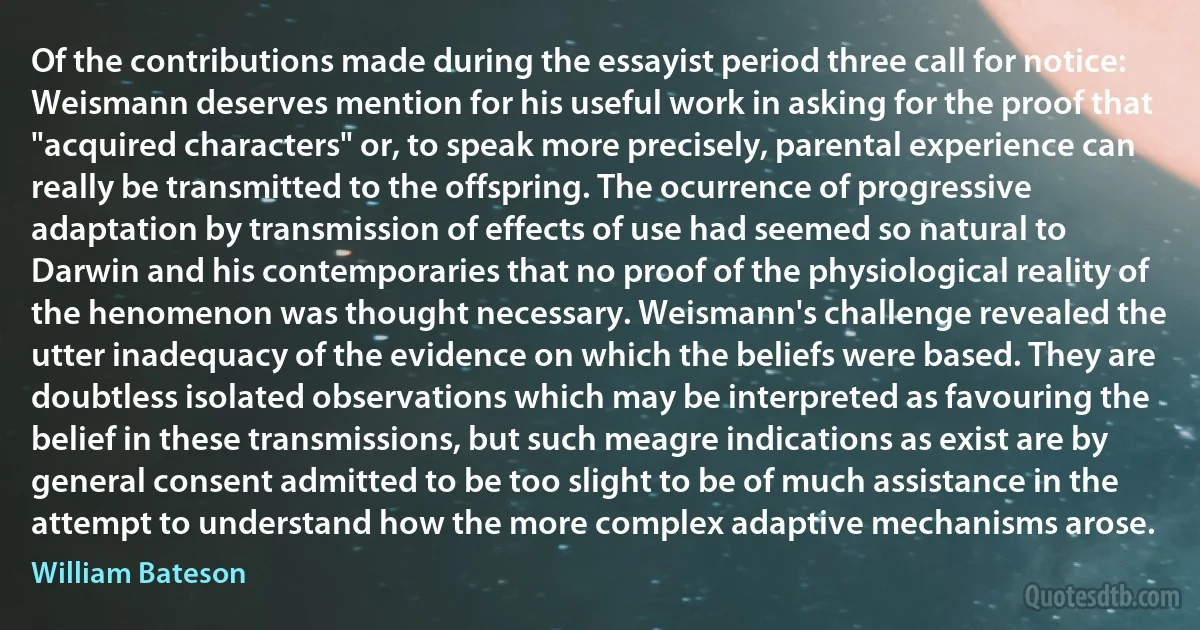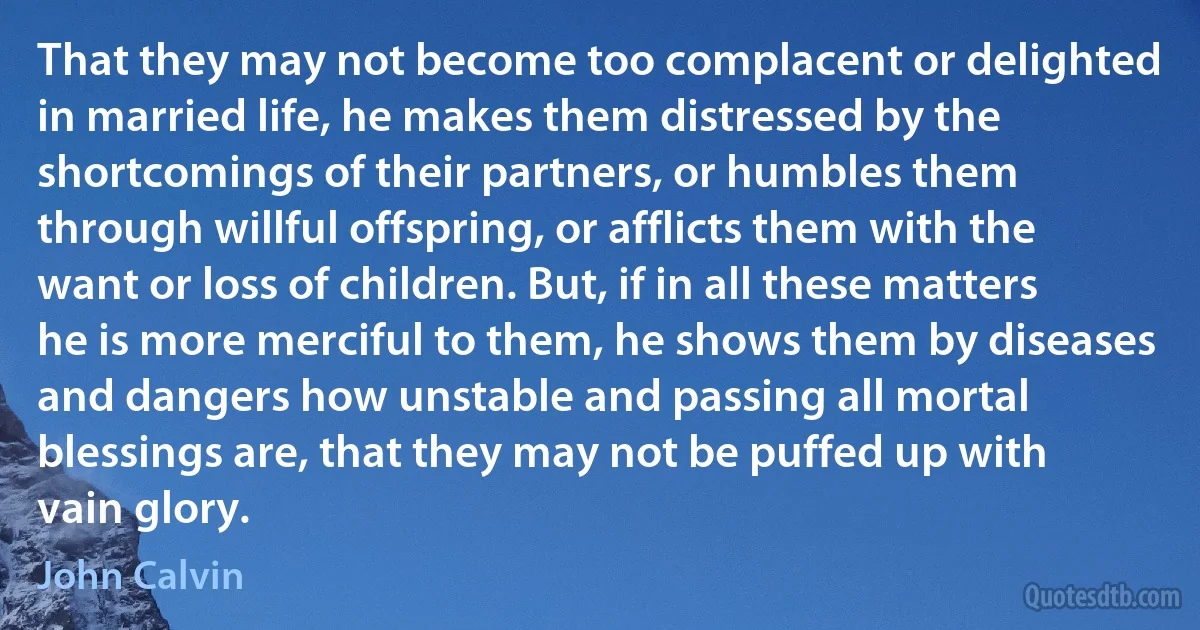Offspring Quotes - page 3
They took infants from their mothers' breasts, snatching them by the legs and pitching them headfirst against the crags or snatched them by the arms and threw them into the rivers, roaring with laughter and saying as the babies fell into the water, "Boil there, you offspring of the devil!"

Bartolomé de las Casas
I... chose rather to publish... in puris Naturalibus, or as they were produced as first, than be at the Trouble of reducing them into any other Form... I could not bear the Pains of reading over again a great Part of these Things; either from my being tired with them, or not caring to undergo the Pains and Study in new modelling them. But I have done in this as weakly Mothers, who give up their Offspring to the Care of their Friends, either to Nurse and bring up, or abandon to the wide World. One of which is Mr. Isaac Newton, my Collegue, a Man of great Learning and Sagacity, who revised my Copy and noted such Things as wanted Correction, and even gave me some of his own, which you will see here and there interspersed with mine, not without their due Commendations. The other is Mr. John Collins (who may be deservedly called the Mersennas of our Nation, Born to promote this Science, both with his own Labours, and those of others. Who with much Trouble took care of the Edition.

Isaac Barrow
Stripped to its essentials, every decision in life amounts to choosing which lottery ticket to buy.... Most organisms don't buy lottery tickets, but they all choose between gambles every time their bodies can move in more than one way. They should be willing to 'pay' for information---in tissue, energy, and time---if the cost is lower than the expected payoff in food, safety, mating opportunities, and other resources, all ultimately valuated in the expected number of surviving offspring. In multicellular animals the information is gathered and translated into profitable decisions by the nervous system.

Steven Pinker
He has told me he likes men as well as he likes women, which seems only natural, he says, since he is the offspring of two sexes as well as two races. No one is surprised he is biracial; why should they be surprised he is bisexual? This is an explanation I have never heard and cannot entirely grasp; it seems too logical for my brain.

Alice Walker
They can't be worse than vampires. And you did all right with them."
"Did all right with them? By which I take it you mean we survived?"
"Well..."
"Faeries," Jace went on, as if Simon hadn't spoken, "are the offspring of demons and angels, with the beauty of angels and the viciousness of demons. A vampire might attack you, if you enter its domain, but a faerie could make you dance until you died with your legs ground into stumps, trick you into a midnight swim and drag you screaming underwater until your lungs burst, fill your eyes with faerie dust until you gouged them out at the roots-"
"Jace!

Cassandra Clare
Life is bacterial and those organisms that are not bacteria have evolved from organisms that were. ...Gene exchanges were indispensable to those that would rid themselves of environmental toxins. ...Replicating gene-carrying plasmids owned by the biosphere at large, when borrowed and returned by bacterial metabolic geniuses, alleviated most local environmental dangers, provided said plasmids could temporarily be incorporated into the cells of the threatened bacteria. The tiny bodies of the planetary patina spread to every reach, all microbes reproducing too rapidly for all offspring to survive in any finite universe. Undercover and unwitnessed, life back then was the prodigious progeny of bacteria. It still is.

Lynn Margulis
There were abuses, many of them. I do not pretend to defend these abuses. There were kind masters and cruel masters. There were violations of the moral law that made mulattoes as common as blackberries. In this one particular slavery doomed itself. When white men were willing to put their own offspring in the kitchen and corn field and allowed them to be sold into bondage as slaves and degraded as another man's slave, the retribution of wrath was hanging over this country and the South paid penance in four bloody years of war.

Rebecca Latimer Felton
I have begun to see that even my father's harshness was a kind of love. An imperfect love, to be sure, but love nonetheless. He pushed me because he loved me, because he wanted no man to ever look down at his offspring. Now with time, rather than bitterness I feel blessing.... My initial fury has slowly given way to forgiveness.

Michael Jackson
Modern 3D cinema technology works by ensuring your left eye sees one image while your right sees another. But they could, presumably, issue one pair of specs comprising two left-eye lenses (for children to wear), and another with two right-eye lenses (for adults). This would make it possible for parents to take their offspring to the cinema and watch two entirely different films at the same time. So while the kiddywinks are being placated by an animated CGI doodle about rabbits entering the Winter Olympics or something, their parents will be bearing witness to some apocalyptically degrading pornography. The tricky thing would be making the soundtracks match. Those cartoon rabbits would have to spend a lot of time slapping their bellies and moaning.

Charlie Brooker
There was no design in this: no sense of improvement, of purpose. All that was happening was that each organism was struggling to preserve itself, its offspring, and its kin. But as the environment slowly changed, so through relentless selection did the species that inhabited it. It was not a process fueled by life, but by death: the elimination of the less well adapted, the endless culling of inappropriate possibilities. But the potential of an unseen future was no consolation to those who lived through the relentless culling.

Stephen Baxter
When the fifth from my offspring disappears, then, I adjure you by Allah to watch for your religion so that no one would take it away from you. Without doubt, there shall be an occultation for the holder of this matter, until such time that (most) people who believe in his Imāmat would leave their belief. Verily this (occultation) is but a test by Allah, the Glorious, for his creation.

Musa al-Kadhim
We are programmed to find sex pleasurable for one simple reason-because animals who mate have offspring. Those who do not mate have none. Traits that result in successful reproduction get reinforced and passed on. Evolution is that simple.
It is therefore useless to bemoan as evil the fact that men tend toward aggression. Among our ancestors, aggression often helped males have more offspring than their competitors. "Good” and "evil” had little to do with it.
That is, until we reached consciousness, at which point, good and evil became pertinent indeed! Behaviors which might be excusable in dumb beasts can seem perverted, criminal, when performed by thinking beings. Just because a trait is "natural” does not oblige us to keep it.

David Brin
If you were to believe all the old, degenerate German legends, there's a Grail in every castle, a Charlemagne or an Arthur under every mound! There not a noble house without at least one werewolf offspring or a younger son who's made a pact with the Devil, an uncle practising the profane arts of alchemy, a vampirical grandfather, a mad monk, a ruined abbey in the grounds where witches meet, an incarcerated lunatic (or heiress-or both), an infanticide or two (and a patricide), and, of course, a family ghost.

Michael Moorcock
Actions may be laudable or blameable; but they cannot be reasonable: Laudable or blameable, therefore, are not the same with reasonable or unreasonable. The merit and demerit of actions frequently contradict, and sometimes controul our natural propensities. But reason has no such influence. Moral distinctions, therefore, are not the offspring of reason. Reason is wholly inactive, and can never be the source of so active a principle as conscience, or a sense of morals.

David Hume
You need only look around you, replied PHILO, to satisfy yourself with regard to this question. A tree bestows order and organisation on that tree which springs from it, without knowing the order; an animal in the same manner on its offspring; a bird on its nest; and instances of this kind are even more frequent in the world than those of order, which arise from reason and contrivance. To say, that all this order in animals and vegetables proceeds ultimately from design, is begging the question; nor can that great point be ascertained otherwise than by proving, a priori, both that order is, from its nature, inseparably attached to thought; and that it can never of itself, or from original unknown principles, belong to matter.

David Hume
The voluntary spilling of semen outside of intercourse between man and woman is a monstrous thing. Deliberately to withdraw from coitus in order that semen may fall on the ground is doubly monstrous. For this is to extinguish the hope of the race and to kill before he is born the hoped-for offspring.

John Calvin
It is willingly granted that by cultivation the origination of new varieties is favored, and that by man's labor many varieties are acquired which, under natural conditions, would be lost; but nothing justifies the assumption that the tendency to formation of varieties is so extraordinarily increased that the species speedily lose all stability, and their offspring diverge into an endless series of extremely variable forms. Were the change in the conditions the sole cause of variability we might expect that those cultivated plants which are grown for centuries under almost identical conditions would again attain constancy.

Gregor Mendel



